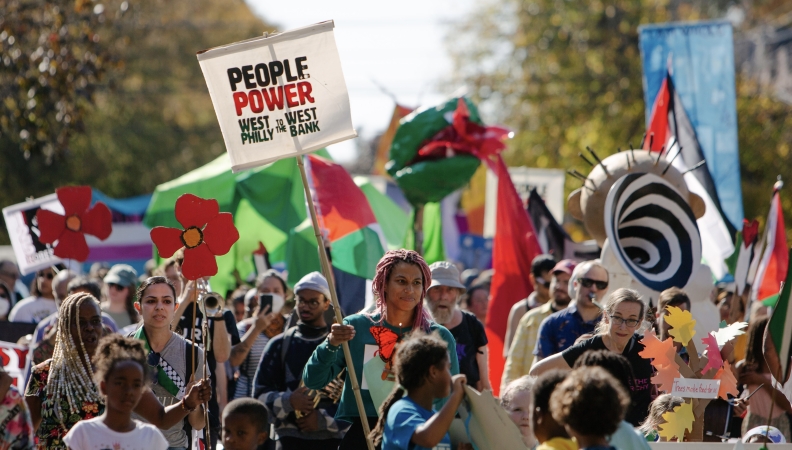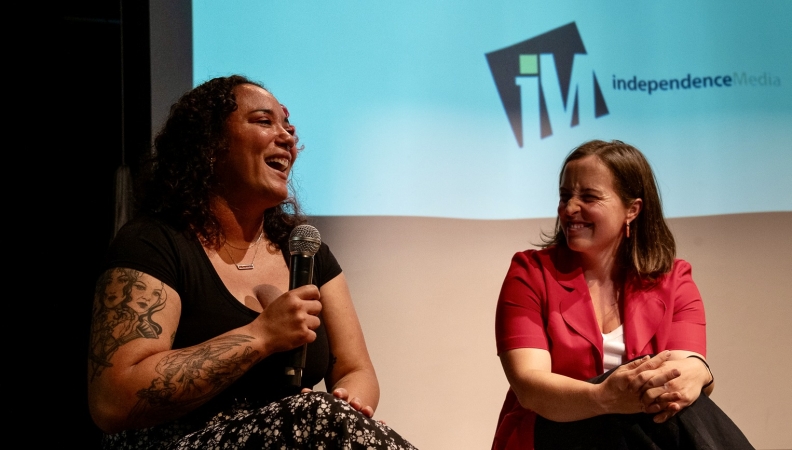Philly Community Media Leaders on Sustainability, Growth—and What They Need Funders to Understand
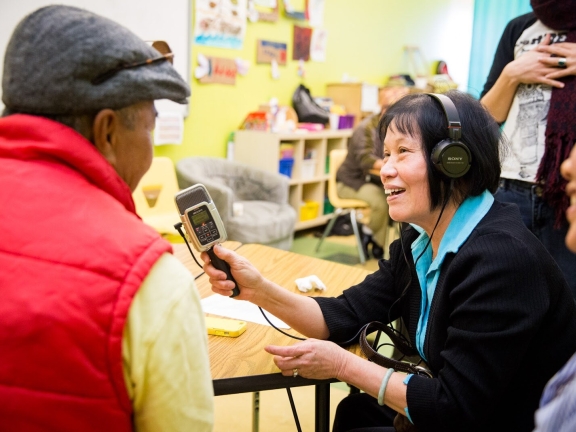
It’s been almost five years since I’ve been working in philanthropy, as IPMF’s Program Officer, and during this time a question I receive most often from organization leaders is, “Can you recommend other funding opportunities?” Underneath that question is an ongoing concern (or fear) around sustainability.
For the small grassroot organization leaders, a grant from IPMF may have been their first or largest grant, and they are looking to build on the momentum. For more established media organizations, they may be looking to expand their staff and needing more resources to grow. And for some larger organizations who may be experimenting with media for the first time, they may be seeking other funders who value their media efforts and are willing to invest in narrative change.
Organization leaders don’t only want their organizations to survive. They want to be able to pay their people livable wages with benefits, and sustain their work—to grow and thrive.
On the philanthropy side, when making decisions about funding, typically these questions arise: How sustainable is this organization or project? Do they have a successful funding strategy? Have they had access to capital? How many other funders support their work? That last question became particularly important when IPMF’s leadership learned more about tipping which can cause a small nonprofit organization to be penalized for receiving “too much” money from one source. As we seek to better understand where grantees are coming from, we also recognize the harm that our sector does when these questions become barriers—a litmus test that determines who is worthy, ready and deserving.
We know that general operating support and multi-year funding is critical to helping organizations sustain themselves. We know that arduous grant applications and reporting requirements get in the way of the work we want to support—making it harder for organizations to dedicate time and energy towards nurturing their people, ideas and the communities they serve. But what else must we know—and do differently to support our partners?
Many of our key grantee partners have grown significantly since receiving initial funding from IPMF. I reached out to some leaders from Love Now Media, Sisters in Film and Television (also known as SIFTMedia 215 or SIFT), cinéSpeak, and Philly Community Wireless (PCW) to hear their reflections about sustainability—and how funders can be better partners.
Specifically, they share insights on scaling up in sustainable ways, different forms of leadership, planning and being flexible to different growth options, maintaining focus on the mission and being comfortable with slowing down. These interviews have been edited for clarity and brevity.
Your organization has grown significantly in the past few years. What experiences, connections or opportunities have helped catalyze this growth?
Eboni Zamani, SIFT: IPMF's support has been a large part of the catalyst that helped SIFT grow. The ongoing financial and operational support ensured that we had time and space to connect with one another and build on our work and similar experiences as indie film and media makers. Also, the pandemic was actually a catalyst that helped bring SIFT members together. With everyone having to be inside, we were able to talk and reach out to each other regularly, build community and build out SIFT.
Jos Duncan Asé, Love Now Media: Our vision for impact has been the key factor in our growth. Over the past few years, particularly following the pandemic, racial uprisings, and political chaos, it's been very easy to identify ways that our work could serve our community. So, in thinking about growth, I want to say the greatest catalyst for it is understanding our framework and our ability to offer 'something' in this moment.
We have also grown significantly due to me going full time with this work in 2021 and committing to hiring full time team members to make Love Now Media a fully functioning institution. Prior to 2021, I worked other jobs and divided my time between leading Love Now Media, often without compensation or support. Funders such as IPMF, the William Penn Foundation, Jordan Brand, Spring Point Partners and the Lenfest Institute created opportunities for us to apply and receive funds to establish a strong foundation as a full operation.
[Shifting] from a fiscally sponsored project to a 501(c)(3) gave our leadership team more transparency, ownership, and agency in the way we approached fundraising. Board members who have championed our work and connected us to funding partners, paid clients, and increased visibility have also supported our growth.
Sarah Mueller, cinéSPEAK: The investment in funders (IPMF, William Penn and another larger donor) allowed us to grow our team so we can grow the organization. For the first seven years of our existence, I volunteered my time. Receiving program and general operating support allowed us to begin to pay ourselves. And for me especially, funding allowed me to do less gig work—I was used to juggling 1000 jobs.
Funders trusting us and investing in us allowed us to be able to grow and pay our team, which then also encouraged them to contribute to the growth of our organization, which leads to more growth, because you have more heart in the game in a very tangible way.
Alex Wermer-Colan, Philly Community Wireless: Our fiscal sponsor, the Movement Alliance Project, and our ISP partner, PhillyWisper, provided a firm foundation for our rapid growth after a series of grassroots meetings at the start of the pandemic in 2020. The development of our community network over the last few years has been catalyzed by the energy of dozens and dozens of volunteers, as well as our growing staff, who took outsized initiative over the years to get things off the ground.
Our organizations’ decentralized design has allowed for sustainability with continued growth, offering a variety of ways for people from diverse backgrounds to get involved at nearly all levels of the organizations’ operations, and at widely different levels of commitment and time. We retain a general investment in keeping costs for the organization low without sacrificing the quality of our essential services. In this vein, we’ve always sought to slowly scale up staffing in a measured and careful way, regularly reassessing our org structure and needs as we define what a community network is going to look like in Philadelphia.
Our commitment to empowering volunteers to make contributions to subprojects has been essential to our success, with roughly 75 people having formally signed up as volunteers. Many more have contributed to the network’s growth both as community ambassadors and hosts of the network infrastructure, as well as through contributions by staff and members of partner organizations in the community.

Funders often talk about organizations learning to pace themselves as they grow. How do you balance not overstretching / mission creeping with increased funding?
Eboni, SIFT: I think we've done our best not to take on more than we can handle and focus on member needs and desires that align with our mission and vision.
Jos, Love Now Media: Each year, I've created a strategic plan with very specific goals for programs, projects, outputs, inputs and tools and tactics to help us achieve them. At least monthly, I find that projects and ideas come our way that are enticing but not in alignment with our strategic plan. I've learned the discipline of turning those things down because my experience has taught me that ultimately impacts the quality of the work we are putting out. It's a fine line to balance. Sometimes we do stretch a bit but we are sure to evaluate which projects are worth that and which projects could simply be a distraction.
Sarah, cinéSPEAK: We’re always figuring it out and reassessing the plan for what it means to grow well and sustainably. Growing at a slower pace is better for everyone. We do a lot of our work through a collective process. It’s slower. We are learning that we have a good sense of who we are and what we're about, and we're trying now to look back at our history and to codify the work that we do and focus on doing things that are really important for the structure of the organization (like employee handbooks, building our website, creating standard operating procedure documents and HR policies). I think a lot of times nonprofits don't take the time to think “who's going to do the work after me?”
Alex, Philly Community Wireless: On the one hand, this is our greatest challenge, because we can grow in two divergent directions—expanding the scope of our services and network coverage over the entire city, or deepening the complexity and immersion of those services and the network itself in our primary service area. The more we expand our focus, the less attention we can give to every member of the community. For this reason, we have not wavered from our commitment to the area where we started, North Philadelphia neighborhoods of Norris Square, Fairhill and Kensington.
We believe our alternative model for broadband access can achieve the greatest impact at the lowest cost, not least because we meet the community where they are at. Our internet service is not only free for the user, but affordable to build and sustain. With that said, the bigger our network gets, the more maintenance it requires, and the more people we can engage with on a regular basis, requiring more staff, volunteers, and capacity organizationally. As ED, I try to support staff and volunteers in pursuing a wide-range of sub-projects, while keeping our focus on the areas where we can have the most impact building out a community network.
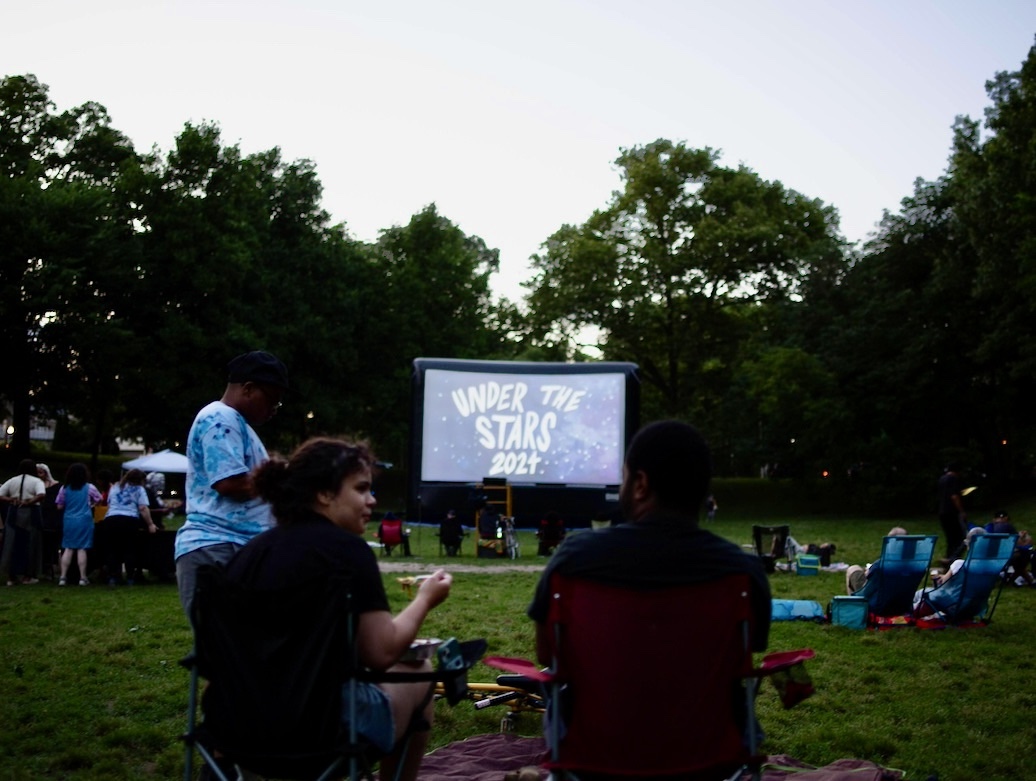
What advice would you share with other organizations who are preparing to grow at a sustainable pace?
Nadine Patterson, SIFT: It's important to know when to exit the stage and pass on the torch to the next generation. As we grow older and/or assume caretaking responsibilities it may be time to share the load of leadership or to pass it on. It's also important to allow for an infusion of new ideas and perspectives in an organization. One mistake many of the large legacy media arts organizations in Philadelphia make is that the leadership stays on forever. Unless that leadership is inquisitive and constantly learning new things and surrounding themselves with people who will challenge them in a healthy way, an organization can become stuck and lose touch with its constituents.
Eboni added: It's important to continue to find ways to build, communicate and collaborate as you grow. Processes and procedures for forward movement and growth prior to growth happening are necessary.
Jos, Love Now Media: I've learned that as a leader, I have a lot of shortcomings and that my team helps me to balance them out. I'm a visionary. I always have an idea. I can usually see ways that our work aligns with service and I can plan ways to creatively make those things happen. In order to grow though, I have had to onboard team members who could slow me down so that my ideas take root. They ask questions that I had not considered. They document answers, invite feedback, and debrief in ways that help us to improve upon our work. I would offer the advice to onboard team members who think differently from you and have different temperaments.
Sarah, cinéSPEAK: Our work is fundable. It has been really helpful to have somebody outside of ourselves and give us some confidence in the process, and to also do the research. Working on a business plan or a strategic plan is really helpful, or even taking the time to do a retreat with your staff and do goal writing for the next three months.
We were so reactive for so long but we're doing far more advanced planning now, like a full season out, whereas before, it used to be like a couple weeks. Setting goals for yourself is really important. We took the time to do a spring fundraising campaign, but we took a couple months planning out what that campaign rollout would look like, and then set an achievable goal and invited our team to participate in that plan. And because we had set a plan for ourselves, it was really easy to implement, and we achieved—and surpassed our goal. That was really exciting, and it added a little fire to our team.
Alex, Philly Community Wireless: Building an organization from the ground-up means doing things before you’ve made a policy for it, and that requires a lot of on-the-ground decision-making, experimentation, patience, fortitude, and attention to the present and near-future. Accepting that the process of growth is somewhat organic, and gently trying to guide the organization in a certain direction, ends up being a primary task and challenge over time.
Organizations often rely, out of necessity, on two separate administrative and operations teams, and the bridge between these two teams can often be difficult to sustain. How do we ensure our board members understand the problems faced by our installation teams? And how do we make transparent for staff and volunteers the decisions being made by administrative teams, so that we retain our spirit of decentralized collaboration? Documentation and project management software are essential, not least because our staff and volunteers rotate, but, in the end, the personal relationships and commitments that form between the directorial team and the organizations' members plays a far more central part in gluing things together.
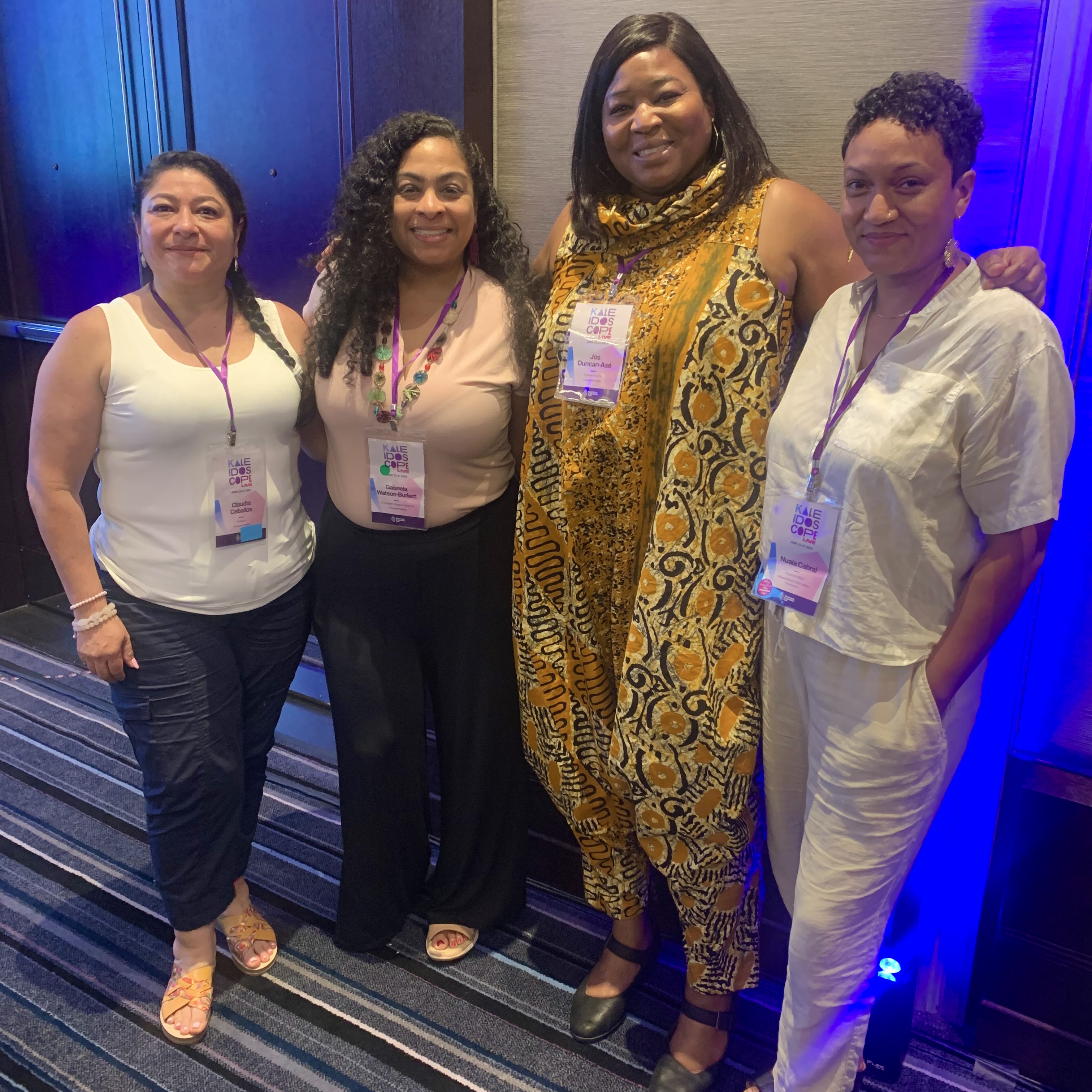
How can funders support organizations to grow at their own pace?
Eboni, SIFT: General operating support and/or unrestricted funding is needed. It allows for an organization to allocate funding where it may be most needed or could be most beneficial for growth as opposed to being forced to spend funding in specific ways. Strategic growth support, professional development and possibly even retreats or access to resources to various options and possibilities will also help organizations grow at their own pace.
Jos, Love Now Media: Trust us. Get behind us. Give us a little time to fumble a ball on occasion. Being able to make mistakes in real time is a more valuable form of professional development than paying a consultant to lead a workshop. Having space like this to share this kind of feedback seems really important also. It makes me feel seen and it gives me the ability to share what I am learning as a source of wisdom for others—even as I am still learning.
Sarah, cinéSPEAK: I think continuing to do multi-year support, general operating support, is really great. What I really liked about William Penn's model is that we were able to come up with a dispersal schedule with them. There was a predictable amount of funding that we knew was guaranteed, so long as we did our report, and then our achievables, we knew that it would be coming.
I think it'd be interesting too, if there was more regular communication between funders and grantees to explore questions like: How is the landscape changing? What are you learning on the ground?
It’s interesting that William Penn is opening up part of their arts and culture funding to address the needs for venues, for example. That's been a major issue: capital support for arts and cultural organizations in the city, and it's now even more pressing, especially in film. I'm really thankful for funders listening and flexing timelines and the scope of what they fund based upon the feedback they get. That's crucial.
Alex, Philly Community Wireless: For an org like PCW that offers a public utility service, rising costs are a sign of success. As our network expands, so do the costs of maintaining it, as do the range of options for further growth. Because we are focused on direct action and redistributive justice, it has taken time for us to identify, for instance, additional means of raising revenue.
By being willing to fund our operations sustainably and offering flexibility on how funds can be spent, IPMF has provided PCW with the most essential element to our growth. That time for experimentation, assessment, and refinement of our organization has been invaluable since the beginning.
As we transition from a start-up to a fully-fledged organization, we struggle with long-term planning based on short-term funding. In this light, it's important that funders assist organizations' in raising and allocating funds towards long-term sustainability, enabling organizations like ours to sustain our essential services for many years regardless of how much we can afford to expand our network coverage.
About the organizations mentioned in this essay:
SIFTMedia 215 is a collective of independent media artists in the Philadelphia metropolitan area to champion socially conscious women-identified filmmakers, particularly from Black and Latinx communities.
Love Now Media, which uses community storytelling to create a more just, well, and equitable future by amplifying acts of love at the intersection of social justice, wellness, and equity.
cinéSPEAK supports Philadelphia-based cinema spaces and audiences for stories of individuals and communities that are often underrepresented in mainstream cinema.
Philly Community Wireless works to grow community-controlled internet infrastructures and offer an alternative model for bridging the digital divide in Philadelphia.
Photo credit: Vietlead, SIFTMedia 215, Tshay Williams for cinéSPEAK and Gabriela Watson-Burkett at Borealis Philanthropy Racial Equity in Journalism Fund Event


